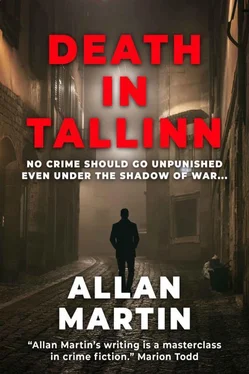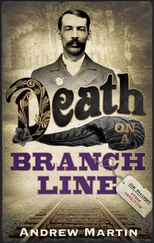“Or they could have knocked him over the head, then thrown him off.”
“Yes, that’s good, Kadakas, because that leads to another possibility. That he didn’t come here himself, but was taken somewhere else, knocked out or even killed there, then brought up here and tossed over the rail. So, plenty of possibilities. But the good news is, once we know what they are, we can start eliminating them. Until there’s just one left.”
“Yes, Sir. Very logical.”
“Quite. Now, while we’re here, let’s see what we can find. Unfortunately, no-one thought to check this spot earlier this morning, and since then it’s been walked over by maybe a hundred people, every one of whom has clutched this railing in his or her sweaty hands. So we’re unlikely to find any finger- or footprints that we can tie to Vaher. The best we can do is have a good look round and see if there’s anything here that might be relevant.”
“Were you thinking of anything in particular, Sir?”
“No. Just see if there’s anything lying around that looks unusual. Look at the surfaces, and into any corners where things could have got caught.”
“Should I get down and crawl?”
“No, I don’t think that’s necessary. And these people will wonder what we’re up to. Half of them are probably up here because they read about Vaher in the paper. So we don’t want to attract attention. We’re more likely to find something around the edges of this area. The central part will have been well-trampled. We’ll start here, go in opposite directions, and meet at the other side. If you find anything, just put it in your pocket.”
Twenty minutes later they met by the archway at the rear of the viewing area, that led to the government and diplomatic buildings that crowded Toompea Hill. Hallmets motioned Kadakas through the arch into the narrow lane beyond. “Come on, let’s find a cafe where we can look at this stuff in comfort.”
He led Kadakas through the lanes towards the onion domes of the Alexander Nevski cathedral, then they turned a sharp left to walk down a sloping cobbled lane that led through an arched stone gateway into the Old Town, to the head of Pikk Street. But instead of heading on to Police Headquarters, they turned right down a lane to emerge into Raekoja Plats, Town Hall Square, dominated by the mediaeval town hall with its arcaded lower level and slim minaret-like tower. There were several cafes facing the square, and Hallmets pointed Kadakas to the Alt-Revaler-Cafe . They were soon ensconced at a window table giving them plenty of light to look at their finds. A waitress came over to take their order, giving Kadakas a lingering smile as she went off.
“Well, what did you find?” Hallmets asked the lieutenant.
Kadakas rummaged in his capacious uniform pockets and fetched out two empty cigarette packets, and the top part of somebody’s false teeth. “Amazing what you can find, isn’t it?” he said, “What about yourself, Sir?”
Hallmets put a torn cigar label on the table. “And there’s this.” He took from his pocket a dull black-and-gold cylinder. A fountain pen, with the black cap screwed on. Round the barrel was still visible despite a coating of dust, a complicated design in gold and silver, the gold still gleaming
“That looks like something valuable,” said Kadakas.
“It is. It’s a Pelikan Toledo. Lying on the ground, right up against the wall. Looks new, too. German, only came out a couple of years ago. As you correctly observed, very expensive. I’ve got a Pelikan pen myself, the 100 model. It’s a good pen, but the Toledo is a luxury item. The sort of pen men sign treaties with. Not something a policeman can afford. And certainly, something you’d want to look after very carefully.”
“Wealthy tourist with a hole in his pocket?”
“That’s possible. But it might also have been dropped by Vaher or one of his assailants. We’ll need to check with Vaher’s widow, see whether he had one like this. OK, the other stuff. What do you make of the cigarette packets?”
“One’s Latvian, Karmen brand, the other’s Estonian, Linda . Both empty.”
“Any writing on the inside?”
The lieutenant peered inside each packet. “Let’s see. No, nothing.”
“The false teeth could be useful. We’ll have to check that with the widow too. And his dentist.”
“Surely someone would notice losing their false teeth.”
“You’d be surprised. Right, now the cigar label; Laferme , they’re made here, quite popular. We might find a suspect who smokes them, otherwise it’s not going to help us. We should see Einar Sepp – he’s the forensic technician. If he’d been up here this morning, he’d have got all this and maybe more.”
They sipped their coffee in thoughtful silence. Hallmets could see that Kadakas was wanting to speak but not sure how to put his thoughts into words. “Come lieutenant, you’ve got something to say. Out with it then!”
“Yes, Sir, it’s about my position in all this. I’m not really sure what I’m supposed to be doing, apart from reporting back to Colonel Reinart.”
“What exactly were the colonel’s orders?”
“To make myself useful to you, and report back to him daily on how the investigation is progressing.”
“OK. Here’s what we’ll do. I’ve no time for people who don’t pull their weight, so if you’re really going to make yourself useful, I’ll use you just like any other member of my team. That means doing police work. I also don’t like being spied on, so I want your reports to be strictly factual, and as short as possible. If you’re not happy with working on that basis, you can go back to Reinart now. What do you say?”
Kadakas hesitated only for a moment. “Yes, Sir, I’m happy with that. Colonel Reinart didn’t specifically say I should report on your handling of the case.”
“Good. One more thing. Your military uniform suits you, as our waitress noticed. However, as detectives, the last thing we want is to stand out. You often see more by blending in with the crowd. So when you come in tomorrow, be in civvies.”
“But Colonel Reinart…”
“Is not your senior officer at the moment. I am. As far as I’m concerned, you’ve been seconded to me for the duration of this investigation. So tomorrow, no uniform.”
“Er, yes, Sir.”
“Good man. Let’s get back to HQ now. We’ve plenty to do.”
9
Artur Simm watched as Jaan Kallas came out of the cafe and shambled along the road. Perhaps he was going to meet an informant now. Artur slipped out of the doorway and followed. But Jaan only led him to the post office, and disappeared inside. Artur hesitated. If he went in, he could be spotted. But then, he could simply be buying a stamp. He pulled his hat down and went in. Luckily, there were a lot of people in there, queueing at the counters or at the shelves by the windows, filling in forms or writing postcards. He joined a queue and looked around for Jaan. Soon he spotted him, in one of the phone cubicles, talking into the handset. After a minute he hung up and left the booth, making for the phone counter to pay for his call. Artur took the opportunity to slip out again into the street, cross the road and wait behind a cart loaded with milk churns, parked behind a sad horse.
When Jaan emerged from the post office and set off, Artur followed, only to be led back to the offices of Pealinna Uudised. Whatever meeting Kallas had arranged would surely happen that evening. He could work on his folklore piece for the next couple of hours.
In his small and cluttered office, Jaan Kallas began to write his copy for the following morning. In the absence of any other information, he was going to write something about Vaher’s methods, and mention some of the criminals he had put away. He picked up his notebook and a file bound in well-worn cardboard, and headed for the archives in the basement. He’d started as a cub reporter with Postimees before the war, and practised his craft with despatches from the front. Then he’d become the crime reporter for Pealinna Uudised , ever since the paper had been born amid the excitement and chaos of independence.
Читать дальше












